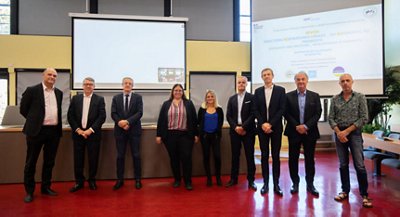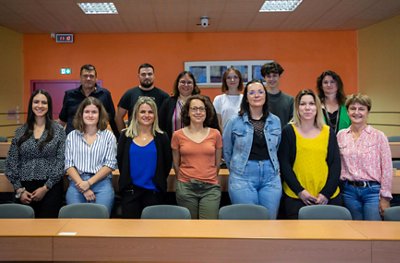On October 11, 2023, the REVIDA Industrial Chair for Respiratory Infectious Diseases, led by researcher Sophie Trouillet-Assant (UCBL / HCL), was officially launched by Claude Bernard Lyon 1 University, Hospices Civils de Lyon, and bioMérieux, with the support of the Agence nationale de la recherche (National research agency, in France). The new program is expected to strengthen the capacity of the health systems to deal with the emergence of new respiratory diseases.
The COVID-19 pandemic has shown the devastating impact of an infectious disease previously unknown. The lack of preventive means and treatment options has greatly exacerbated the crisis. Three years later, the toll is heavy for society, with repercussions throughout the world.
More than ever, the impact of the emergence of new viruses, particularly respiratory viruses, is a major public health concern. Yet, the emergence of viral diseases is expected to pick up pace due to climate change, among other factors.
Aiming for the ability to better cope with these potential emergences, the REVIDA (REspiratory VIral infections - from DiAgnosis to prognosis), industrial chair was created, led by Dr. Sophie Trouillet-Assant (UCBL / HCL).
Hosted at Claude Bernard Lyon 1 University and working within the HCL / UCBL / bioMérieux joint laboratory, it will combine the efforts of the International Center for Infectiology Research (CIRI – CNRS / Inserm / Claude Bernard Lyon 1 University/ENS de Lyon), Hospices Civils de Lyon, and bioMérieux, to offer new, effective and innovative diagnostic solutions, and thus improve the care of patients with respiratory infections.
The goal is to identify more quickly subjects suffering from viral infections, whatever the virus, in order to be more reactive in the event of a new pandemic, with tools that allow fast screening of subjects at risk of developing a serious form of the disease, thus improving patient care.
With this in mind, the ambitious and innovative REVIDA chair project will study the immune response of infected patients, in order to develop new, faster diagnostic and prognostic tools for respiratory viral infections, without systematic search for the pathogen.
“Thanks to faster tools, within 45 minutes of a nasopharyngeal swab, it will become possible to diagnose subjects infected with a virus by analyzing the response of the host exposed to a viral infection. This could have a significant effect on reducing the misuse of antibiotics and on the ability to be better prepared in the event of future viral outbreaks,” explains Sophie Trouillet-Assant.
The combined medical expertise of clinicians from the Hospices Civils de Lyon and skills of scientists and engineers from bioMérieux, a global player in in vitro diagnostics, will make it possible to leverage the research work carried out within the CIRI, in order to ultimately improve the quality of care at the hospital in terms of respiratory diseases.
“Participating in this multidisciplinary research program, bioMérieux aims to develop innovative solutions in partnership with HCL and UCBL. By combining their joint clinical and scientific skills, the goal is to improve the care of patients suffering from respiratory infections,” explains François Lacoste, Executive Vice President of Research & Development at bioMérieux.
“Claude Bernard Lyon 1 University, thanks to the decisive work of its development subsidiary, Lyon Ingénierie Projets, and its Department of Research and Doctoral Studies, as well as institutional and strategic alignment in terms of research training and health innovation with HCL, offers an environment conducive to the emergence of scientific collaborations and projects with industrial partners such as bioMérieux, as is the case for this REVIDA industrial chair,” adds Frédéric Fleury, President of the Claude Bernard Lyon 1 University.
Moving research from the laboratory to the patient's bedside is a joint and shared approach at bioMérieux, the Hospices Civils de Lyon and Claude Bernard Lyon 1 University, which have managed their public/private research partnership for more than 20 years through the creation of a common research laboratory.
“Beyond the importance of the clinical question posed, which is a real public health issue, this project is also the result of a very long-standing collaboration with bioMérieux in the joint research laboratories. These structures have been key in speeding up the R&D of new diagnostic tests during the pandemic. The REVIDA chair confirms the cutting edge approach used by HCL and its partners to enhance public/private partnerships,” said Alexandre Pachot, Director of Health Research at Hospices Civils de Lyon.
The REVIDA industrial chair, co-funded by the Agence nationale de la recherche (ANR) and bioMérieux, will also ensure the supervision of a high-level training program (MSc's, PhD's and post-doctorate research) to work on large-scale collaborative projects of international scope. Claude Bernard Lyon 1 University will be involved, among other things, in a student exchange program with the United States and partner countries in Asia, Africa and South America.
“Since 2012, the ANR has co-funded around sixty industrial chairs, selected for their strong and lasting partnership between public and private research actors, for the scientific reputation of the holder, and ability to structure a high-level research ecosystem in a strategic, high-priority field, and for the research training of young graduates in a remarkable scientific environment. In this context, the REVIDA industrial chair is a perfect example,” declares Ilias Iliopoulos, President of the ANR “Industrial Chairs” committee.
Bringing together researchers, clinicians, manufacturers and students in a common dynamic to respond to significant public health challenges, the chair aims to position Lyon and France at the forefront of respiratory infections management and pandemic preparation, thus strengthening its European and international influence, both in terms of research and training and in terms of the public-private partnership approaches required to deal with it.
The partnership-based approach of REVIDA and the research field of interest are fully in line with the vision of the French BioCluster for Innovation in Infectiology (BCF2I) currently being established.

Launch of the Revida chair, from left to right: Jérôme Honnorat, Vice President and Research Delegate for the “Health” sector of UCBL; Ilias Iliopoulos, Acting President of the ANR “Industrial Chairs” committee; Frédéric Fleury, President of Claude Bernard Lyon 1 University; Aurore Fleurie, Senior R&D Manager at bioMérieux, Co-Head of the HCL-UCBL-bioMérieux joint unit; Sophie Trouillet-Assant, Researcher at CIRI, Head of the HCL-UCBL-bioMérieux joint unit; Alexandre Pachot, Director of Health Research at HCL; François Lacoste, Executive Vice President of Research & Development at bioMérieux; Bruno Lina, Head of the Virology Laboratory, CNR Director for Respiratory Viruses; François-Loïc Cosset, CIRI Director.

The team from the Hospices Civils de Lyon / Claude Bernard University Lyon 1 / bioMérieux joint unit.
Read the full press release
- Filename
- PR_launch_indsutrial_chair_REVIDA_20231011.pdf
- Size
- 416 KB
- Format
- application/pdf